How to navigate common legal issues while camping in the UK?

From the wild and rugged landscapes of the highlands to the tranquil beauty of the lakes and coastal regions, the United Kingdom boasts some of the world's most stunning natural landscapes. The love for camping in this part of the world is deeply rooted among the locals and equally attracts a fair share of international tourists.
However, as you plan your camping expedition, it's crucial to understand the legal implications related to camping in the UK. This article will guide you through the common legal issues surrounding camping in the UK and offer clarity on how to navigate these potential hurdles.
En parallèle : What are the best strategies for camping with young children in the UK?
Understanding the Legalities of Wild Camping In the UK
Wild camping, the act of setting up a tent in the wilderness away from an official campsite, is an ideal way to engage with the UK's beautiful outdoors. However, the laws governing wild camping vary across England, Wales, and Scotland.
In England and Wales, wild camping is not generally allowed without the landowner's permission. Much of the land in these regions is privately owned, and using it for camping without consent can lead to legal repercussions. However, there are some exceptions. For example, parts of Dartmoor National Park in England permit wild camping.
En parallèle : What local wildlife should you be aware of when camping in the UK?
In contrast, Scotland has more relaxed laws. The Land Reform (Scotland) Act 2003 allows wild camping as long as campers behave responsibly, respect the access rights and don’t cause any undue damage to the environment.
Knowing Your Legal Access Rights
Knowing your access rights can save you from potential legal problems while camping. In England and Wales, your right to roam is limited to "access land." Access land includes mountains, heaths, downs, registered commons, and certain land around the England coast. However, even on access land, you don't have a legal right to camp.
In Scotland, the situation is different. The Scottish Outdoor Access Code provides people with broad rights of access to most land and inland water, including for wild camping. However, these rights come with responsibilities. You must respect the interests of other people, care for the environment, and take responsibility for your own actions.
Finding a Legal Camping Spot
If you're keen on camping in the wild, it's essential to be vigilant about where you set up camp. In England and Wales, always seek permission from the landowner before setting up your tent.
The good news is that many landowners will grant permission, especially if you reply courteously, explain your intentions, and ensure them that you will leave no trace of your stay.
If you can't find the landowner or don't get a reply, it’s best to look for an official campsite. The UK boasts numerous well-maintained campsites that provide amenities and a safe environment for campers.
Navigating the National Parks
The UK's National Parks offer some of the best scenery for camping. The laws around camping in these parks vary, and it's crucial to understand them before setting out.
For instance, wild camping is generally not allowed in National Parks in England and Wales. However, there are exceptions like the previously mentioned Dartmoor National Park, where certain areas allow wild camping.
In Scotland, wild camping is allowed in all National Parks subject to the Scottish Outdoor Access Code. But there are exceptions here too. For instance, due to overuse, camping management zones have been established in some areas of Loch Lomond & The Trossachs National Park, where you need a permit to camp between March and September.
Being a Responsible Camper
Finally, being a responsible camper goes a long way in avoiding potential legal issues. This means understanding and following all the camping rules and regulations, maintaining cleanliness, not causing any damage to the environment, and respecting the rights of others.
It's essential to remember that the freedom to camp comes with a responsibility to preserve and protect the natural environment for future generations. Regardless of the camping laws in various regions, all campers in the UK are expected to follow the principles of "leave no trace" camping. This includes carrying out all litter, minimizing fire risks, and avoiding disturbing wildlife or livestock.
In conclusion, while the legal implications of camping in the UK can sound daunting, they need not deter you. By understanding your rights, seeking the necessary permissions, choosing legal camping spots, and camping responsibly, you can enjoy a hassle-free camping adventure in the UK.
The Case for Northern Ireland and Selected Areas in England and Wales
Differing from England, Wales, and Scotland, Northern Ireland has its unique set of rules and regulations concerning wild camping. In Northern Ireland, the law states that all land, including mountains and moorland, is presumed private unless otherwise stated. This means permission from the landowner is required to camp anywhere, including in the mountains. However, don't let this deter you. Many landowners are open to allowing campers, especially if approached respectfully and with a clear intention to leave no trace after the camping experience.
In contrast, selected areas in England and Wales have slightly more relaxed rules. One such place is the Lake District, a popular area for camping. The National Park Authority does not promote wild camping, but it is tolerated in higher fell areas. This means, ideally, you should camp above the highest fell wall, staying for only one or two nights, and avoiding large groups. As always, it's of utmost importance that no litter or other signs of your stay are left behind.
In other places, like the New Forest in southern England, wild camping is strictly forbidden without the landowner's permission, which is rarely granted. Similarly, in the Brecon Beacons in Wales, wild camping is only allowed with landowner permission, and overnight stays in camper vans are not permitted in car parks.
Exploring Available Resources and Tools
To assist you in your wild camping adventure in the UK, an array of resources and tools are available to help you stay on the right side of the law. Many online resources provide detailed maps and guidelines for wild camping. Tools like Ordinance Survey Maps can help you identify access land and boundaries in England and Wales.
In Scotland, the Scottish Outdoor Access Code website provides comprehensive information about where you can and cannot camp. For specific regions like Loch Lomond, which has camping control zones, the National Park's website provides maps and information about where you can wild camp with a permit.
Remember, if in doubt about whether you can camp somewhere, it's best to ask. The local tourist office, park authority, or even local police station can usually provide advice. Some areas also have local camping forums and social media groups where you can ask for advice from experienced local campers.
Conclusion
The beauty of the United Kingdom beckons to campers from around the globe. While the legalities may seem complex at first, understanding the rules around wild camping in different regions is not insurmountable.
Whether it's the rugged highlands of Scotland, the tranquil beauty of the Lake District, the diversity of Dartmoor National, or the serene landscapes of Northern Ireland, knowing the rules and obtaining the necessary permissions allows you to immerse yourself in these stunning locations, free from worry about legal implications.
Remember, the goal is not just to enjoy the natural beauty but also to respect and preserve it. By following the principles of the outdoor access code and adopting a "leave no trace" approach, you ensure that these beautiful landscapes continue to thrive for future generations of wild campers. So, as you plan your next camping adventure, pack your tent, your respect for nature, and your understanding of the laws. Happy camping!
